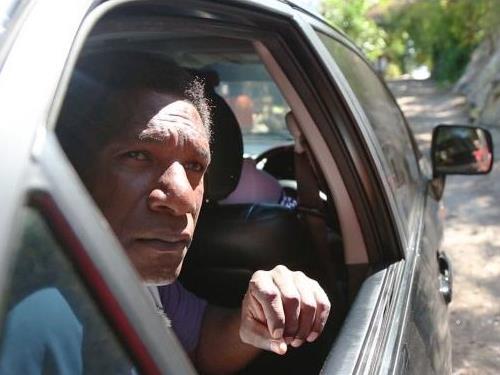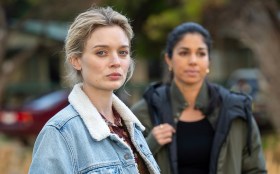Joe Moses, leader of Paga Hill Settlement.
It’s with the sight of houses crumbling that The Opposition commences. Solemn music plays, but the images set a grim tone alone. Signalling her intentions and allegiance from the outset, documentarian Hollie Fifer starts the film with scenes of destruction that cut to the very core of humanity’s needs; witnessing humble shelters torn down by bulldozers as their residents are forced to stand and watch paints a potent picture, and sets a haunting mood that lingers as the feature rolls on.
Of course, The Opposition’s opening moments aren’t an isolated instance. Similar visuals keep coming, saying as much as the first-hand and expert accounts assembled to flesh out this true tale. In an information-dense, tightly interwoven fashion, the filmmaker’s eye for detail fills the documentary’s frames with threat, struggle, and carnage as Papua New Guinea’s Paga Hill Settlement becomes a battleground — for land, for community, for upholding a way of life, and for choosing to live in a caring rather than a cash-dominated society.
As a result, it’s not difficult to predict who the players are in this real-life tussle: on one side sits an Icelandic-Australian developer eager to turn the lucrative seaside site into a hotel, marina, and luxury apartments; on the other are the existing residents, who prove far from the proposed multi-million dollar resort’s target market. It’s not a fair clash, nor a simple one — and, in the film’s depiction, the events unravelled are never less than infuriating.
After the arrival of 100 machete-wielding police officers on Mothers Day in 2012 stems multiple years of investigations, legal efforts, assistance from then-Leader of the Opposition Dame Carol Kidu, allies turned advocates for the developers, court clashes, and arrests, with Paga Hill Settlement leader Joe Moses unflinching in his quest for justice. In her first feature documentary following television efforts Children of The Rainbow Serpent and Common Ground, as well as a number of shorts, Fifer tracks the battle’s many up and downs. Facts fly, and emotions remain high.
Accordingly, knowing how the situation will play out is easy, even for those who haven’t followed the news headlines that have surrounded the saga in recent years, and the production as well. A pervasive feeling seethes through the film, blending Fifer’s infectious anger and passion with inevitability and familiarity. That the feature’s construction, more than competent as it is, hews to the documentary standard also heightens the been-there, seen-that sensation.
And yet, The Opposition helps probe that notion. Using the plight at its centre to subtly interrogate why audiences can guess the outcome, and how they’ll feel about it, might be the film’s strongest achievement. Not only does the documentary give a voice to the 3000 people toiling to save their homes, and compellingly chart the efforts of their leader against the forces of wealth, power, and corporate might; in circumstances that are all-too-recognisable, it asks why, serving up a documentary that presents as well as questions what’s becoming a capitalism-over-community status quo.
Rating: 3 1/2 stars out of 5
The Opposition
Director: Hollie Fifer
Australia, 2016, 76 mins
Rating: 15+
Human Rights Arts and Film Festival
Melbourne: 4 – 18 May 2017
Sydney: 23 – 27 May 2017
Canberra: 29 – 31 May 2017
Perth: 1 June 2017
Brisbane: 1 – 3 June 2017
Hobart: 2 June 2017
June 7 – 18
Actors:
Director:
Format:
Country:
Release:





